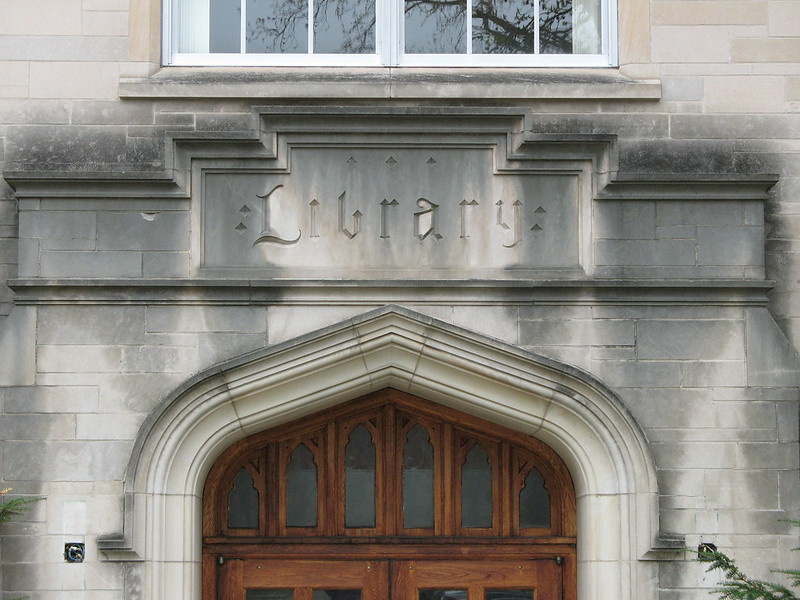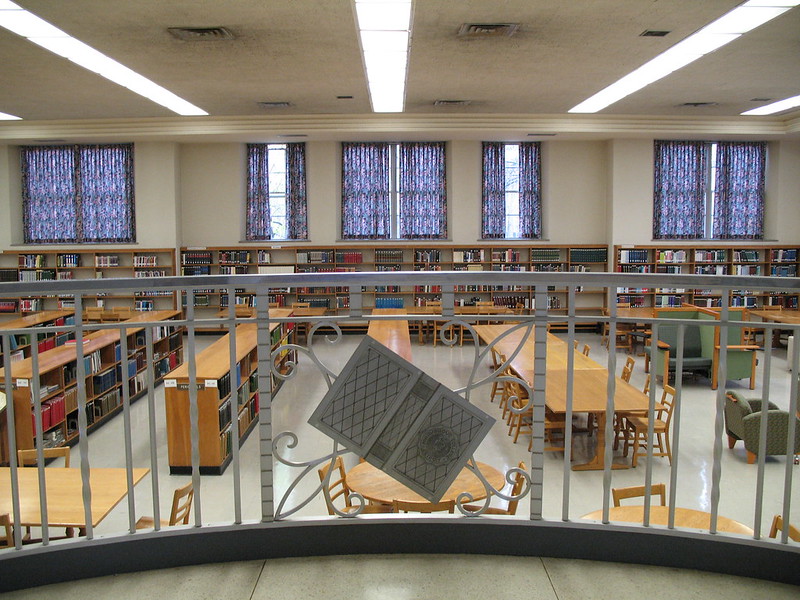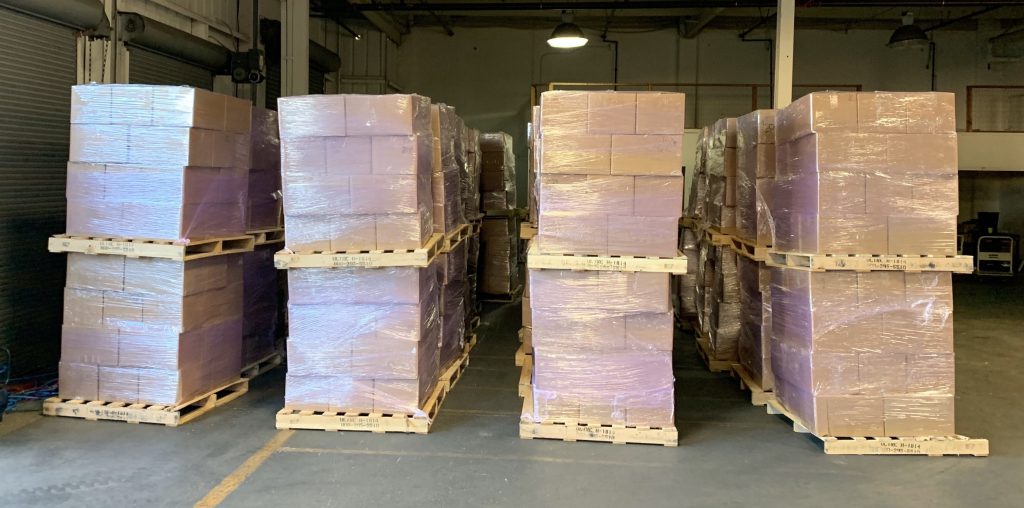“I feel that, sadly, the College is closing, but the library is not. It is re-emerging in a different form.” —Mary Kickham-Samy, Director of Geschke Library, Marygrove College
In June of this year, Marygrove College announced that the graduate college, located in Detroit, would close on December 17.

Founded in 1905 by the Sisters, Servants of the Immaculate Heart of Mary congregation (SSIHM, or IHM for short), the college has operated out of its Detroit campus for 92 years. Facing financial difficulties in 2017, the college closed its undergraduate programs, but continued to offer its graduate programs in education, human resource management, and social justice. Unfortunately the college was unable to attract the additional students required to keep programs in operation, and the decision to close was made this spring.
Beyond the challenges of what would happen with the grounds and buildings (which will continue to be used for educational purposes), a key question for administrators was “What will happen to the library?” With more than 70,000 books and nearly 3,000 journal volumes, the Geschke Library is a well-curated, world class collection with strengths in the humanities, education, and social justice. The collection reflects the strong historical and cultural influences of the city of Detroit, bringing a uniquely African-American perspective into the light. After a thorough review of possible options, Marygrove College President Dr. Elizabeth Burns and college administrators decided that the entirety of the library’s collection would be donated to the Internet Archive so that the materials could be digitized and made available to students and researchers all over the world.

I had the opportunity to talk with Dr. Burns and Mary Kickham-Samy, Director of Geschke Library, by email about the work they are doing to ensure that the legacy of Marygrove College will live on. What follows is a poignant reflection on the library’s closure with an optimistic view towards its digital future, and what it means for the local Marygrove College community and scholars across the globe.
Chris Freeland: Dr. Burns, how did Marygrove College determine that Internet Archive was the best home for the collection?
Elizabeth Burns: The College explored several options for the disposition of the collection. We wanted to preserve as many books as possible and also be true to the IHM ideal of sustainability and care for the Earth (IHM is our sponsoring order of Catholic nuns, based in Monroe, MI). We didn’t want the majority of the volumes to end up in a landfill. The concept of both preserving the collection and having it available to all was endorsed by the Board. While some are grieving the removal of the book and materials, most welcome the idea of online availability. In this way, the collection that was carefully built over the years by Sisters Claudia and Anna Mary, along with other library directors, will live on. We are pleased to have this as a legacy.
What does it mean for students anywhere in the world that the library will continue to be available online?
Burns: Marygrove College has always been committed to education and outreach. Our sponsoring congregation, the IHMs, have started schools all over the world. Our graduates have also taught in many parts of the world. To have the collection available to students means that the Marygrove mission will continue. We hope that our collection, especially the Detroit collection and the Social Justice collection will be of use to scholars and to students of all ages.
How about from your perspective as a librarian, Mary? What does it mean for researchers that the library will still be available?
Mary Kickham-Sandy: Students everywhere will not only gain free access to a wealth of information and resources, but they may also gain a greater awareness of the legacy of Marygrove College, as well as the culture and history of Detroit. Also, many local libraries in Michigan do not have the scope of books about Michigan that Marygrove has. So, by digitizing the Marygrove Library collection, Michigan students will have greater access to resources about their state.
Mary, as a fellow librarian myself, it’s difficult to consider closure. What’s it like to close a library?
Kickham-Samy: When I began my career as a librarian in 1998, I did not imagine that one day I would be responsible for closing a library, especially one as mature, robust, and cherished as the Geschke Library of Marygrove College. I feel that, sadly, the College is closing, but the library is not. It is re-emerging in a different form.
What considerations were you making about the collection?
Kickham-Samy: I had two main concerns: the legacy of Marygrove College and the cultural importance of the Library to the neighborhood and the larger community of Detroit. A couple [of] community members expressed discomfort with the idea that the Library would be removed from the neighborhood and from the city. I consulted with librarians at Wayne State University (WSU) about the possibility of housing the Detroit and Michigan books in the WSU library system. However, after some discussions, we reached a consensus that the collection would be more accessible in a digitized format.
Dr. Burns, I’m sure that Marygrove College’s closing was extremely difficult news for your alumni. What does it mean to alums that the library will continue to be available online?
Burns: When this possibility was announced at the all-class reunion in September, they were overjoyed. They feared that the collection would be lost forever. The fact that it will continue to be available as a living legacy is important to them.
Finally, to both of you, what is your hope for the collection?
Burns: My hope is that it will be useful for scholars and for students across the globe. I also hope that some will be curious about the College and the IHMs and will read the College’s history and understand the work done in Detroit for over 90 years. The work of education goes on and I’m grateful to the Internet Archive for allowing us to participate in this important endeavor.
Kickham-Samy: My hope is that the Internet Archive will elegantly display the depth, breadth, and beauty of the Marygrove College Library collection. I hope that those who view our collection will not only find the information they seek, but will also witness and appreciate the College mission to promote social justice through activism, a theme that runs through the development of the collection from its early days until its final one.
Postscript

Last month a crew organized by the Internet Archive packed and moved the contents of the library into 5 shipping containers and sent them to our Physical Archive facilities in Richmond, California. Yesterday the first container of books was sent to be digitized in our scanning facility, with the resulting digital books appearing online in 2020. While we mourn the closure of Marygrove College, we are grateful to play a role in preserving the legacy of Marygrove College and the Geschke Library for generations to come